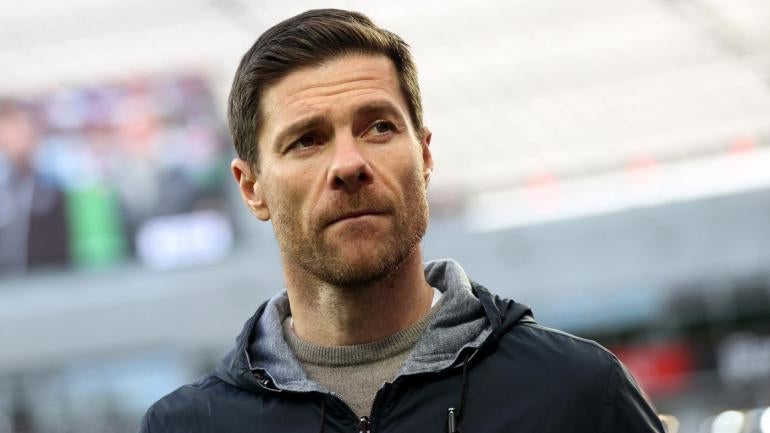
LEVERKUSEN -- From the chief executive to the players, everyone associated with Bayer Leverkusen will tell you it is much too soon to start talking about the first Bundesliga title. It's just 11 games. The team so cruelly dubbed "Neverkusen" after the trophy-less, nearly treble of 2002 has been burnt often enough.
"Trophies will be decided in May," warns club CEO Fernando Carro. "We've still won nothing," counsels Granit Xhaka, a man who knows from grim experience that even the brightest of starts don't guarantee you a title when you are being chased by one of the continent's super clubs. "The challenge now is not up against Bayern, it's against what we can do," insists Xabi Alonso, the head coach who has taken Leverkusen from the relegation zone to top of the table in a little over 13 months.

Golazo Starting XI Newsletter
Get your Soccer Fix from Around the Globe
Your ultimate guide to the Beautiful Game as our experts take you beyond the pitch and around the globe with news that matters.
Thanks for signing up!
Keep an eye on your inbox.
Sorry!
There was an error processing your subscription.
They might not want to talk about championships in November, but it is at least fair to note that if this were going to be the team to bring the Meisterschale to the BayArena for the first time in the club history, to win a major honor for the first time since 1993, they have gone about it the right way. The 31 points they have accrued through 11 games is the best record of any Bundesliga side, level with the Bayern Munich of 2015-16, one in which Alonso played a key role.
The only two points Leverkusen have dropped this season came against Bayern, champions eight years ago and in every year since. Alonso might reasonably conclude that his side were at least a match for the German football juggernaut that day, much as they are proving to be throughout the campaign so far.
In all competitions Die Werkself have a record of played 17, won 16, drawn one. They have scored 59 goals, conceding 14. In the Bundesliga and Europa League their expected goals tally reads 32.8 for, 15 against. They -- and in particular Alex Grimaldo and Jonas Hoffman -- may be running searingly hot in front of goal, but even if you look at the xG, a better predictor of future performance than the goals themselves, this has the look of one of the best teams in Europe, let alone Germany.
The road to the top
You would have gotten exceedingly long odds on such circumstances when Alonso took the helm 13 months ago. Their hopes of making a profound impact on the Champions League had already been dealt a critical blow by back to back defeats against Porto, but in the Bundesliga the crisis was all the more profound. Eight games into the season a side that had been hoping to compete for a top four finish found themselves scrapping in the early year relegation zone. These were not the sort of circumstances tailor made for a coach whose only previous experience came with the Real Sociedad B team.
"People were not clapping when we hired him," says Carro. "People said he has no experience, why do you do this?" When Carro and sporting director Simon Rolfes travelled to San Sebastián after sacking Gerardo Seoane, however, Alonso won them over. The latter delved deep into the Basque's tactical vision, the former found himself taken with his new coach's qualities in the dressing room.
"That role is a big leader. You not only have to understand football, you have to understand people and leadership. You have to understand what a dressing room needs. He gave me the impression he knew exactly what that was."
What his players needed on his arrival last October, Alonso concluded, was a reminder that this was a team who had finished an impressive third in the Bundesliga the previous season. There was and is no shortage of talent in the Leverkusen squad, but belief had evaporated.
"The players had the quality, the potential to do much better," says Alonso. "It was about trying to get that commitment, that self esteem from them, to show them that they could do better and what they were not doing right. We were not intense, we were very passive. Without intensity, it was impossible."
Now the intensity of this team hits you, and opponents, with megaton force. Alonso's vision might be for a possession-led system, but he winces at the suggestion his side play anything like "tiki taka." Having the ball is not a safety valve, it is not to be used as the most effective form of defense. If Leverkusen have the ball they will be moving it swiftly and with purpose, probing defensive lines. When they concede it they snap to get it back, with the purpose that brought their first goal in Sunday's 4-0 thrashing of Union Berlin. Majestic playmaker Florian Wirtz forced a turnover before teeing up Grimaldo for a swirling shot that flew above Frederik Ronnow. Even in the all action Bundesliga, Leverkusen press with above average intensity while making 40 more passes per game than anyone else.
At their best, as they were at the weekend, they play with the sort of precision that screams Xabi Alonso. It is no wonder he seems to light up when he joins the training ground drills, still pinging long balls like the player he was 15 years ago, smashing home almost every shot that comes his way, his rondos all flicks and perfectly weighted passes. He still prefers playing even if he isn't clamoring to put his boots back on.
"I'm not like 'come on coach, put me in…'. I like to see my team play the way I used to like to play."
Leverkusen are a team that seem to have learned their manager's lessons. Their tempo, in particular, is exquisite.
"We don't talk that much about 4-2-3-1 or 3-2-4-1," says Alonso. "It's more about what we think will happen in the game and what we think we should do to gain some advantage.
"Many times, with the quality of the players, we get some benefit. But the more passes we give in the opposing half, the better position we'll be in to gegenpress. If we move too quickly and too far into the other half, we'll be further from each other and it would be impossible to gegenpress properly. You need to know the right moment, you need to know when to stop a counter attack with a direct tackle or when to slow down and to give time to get the lines together.
"There are different moments, different situations and the better we identify them on the pitch, the better we will do."
Alonso has no intention of identifying these situations for his players. "I was encouraged to have my own criteria on the pitch, to make my own decisions. And that's something that I really push and really remind my players, that they have their own decision making. It's not about being robots, we don't always have do this and then do this and if not you are on the bench. No. We tried that. They have the knowledge to know what might happen with their qualities to decide what is good."
A side battling in the Bundesliga's lower reaches is not going to be in a position to work with such autonomy, as Alonso hints at above. Work had to be done, particularly on a defense whose most consistent attribute was its bouts of ineptitude. Pulling Leverkusen out of their funk took time and a 4-0 win in his opening game against relegation-bound Schalke was followed by a bruising 5-1 defeat at Eintracht Frankfurt and a comprehensive defeat at RB Leipzig's hands.
It says a great deal about the standards he sets for himself that Alonso talks of his early time in the job as a struggle. Even after a run of one win in five league games in January and February Leverkusen were 10th but the 41 year old speaks of a team who early in his tenure "had many problems." Carro and Rolfes never doubted their decision. Nor did Alonso.
"I had the feeling I had taken the right steps. It was the moment I tried or I stay home. Watching could have been an easier life, more relaxed than right now, but even when the results weren't [what I wanted] I didn't regret. I was really focused on trying to improve them. From Simon, Fernando, the club, they were aware that the situation was not easy, that we needed time. They had a good feeling we could change things over."
New additions
When Leverkusen visited St. Louis during the World Cup break, the thoughts of the club hierarchy had already turned to what the following year might bring. Once more, his vision persuaded those above him. "What he says makes a lot of sense," says Caro. "It has an impact. When we discussed transfers for the summer in St. Louis he wanted to have a balanced team of experienced players."
That he got. The £55 million Aston Villa gave them for Moussa Diaby — a de facto replacement in Unai Emery's side for another former Leverkusen winger in £30 million Leon Bailey — largely went on veterans to supplement the young core at the BayArena. Victor Boniface was the youngest major arrival at 22, following Alex Grimaldo, 28, the 31-year-old Jonas Hoffman and Xhaka.
The former Arsenal man is the player around whom Leverkusen pivot. More than once, a staff member will reflect on the similarities between the Swiss international and his new manager. Xhaka's 112.7 touches per 90 minutes is bettered by only six players in Europe's top five leagues (one of them his team mate Exequiel Palacios). Rodri, the hub of Pep Guardiola's Manchester City is the only midfielder to attempt more passes. After seven turbulent years in north London, the 31-year-old is playing as well as ever in what has always appeared to be his best position, one of two in a midfield pivot. Alonso knew even before signing Xhaka that he and his fellow summer additions would add "football intelligence" to the Leverkusen side. Xhaka himself was no less swiftly taken by his new club.
"This is what I had in my first conversation with the club and the coach. "Even more when I came to the dressing room and saw the hunger of these guys. I was more than happy to be back, let's say, at home. I know the Bundesliga, I've been here when I was a little younger. The hunger is not enough if you don't work. Our work, day by day, is amazing."

Xhaka himself is one of the motors driving such high performance. He is, Alonso says, "fundamental" in translating the coaching staff's vision to the dressing room.
"When you are not there and the team is on their own, two, three guys repeating the same message you've been giving is fundamental. When you have that you have a big part of the team in your hands. We have signed very strategic players, to give us stability, to be reliable players, to be more efficient and consistent in our football. Not players with ups and downs. They are very, very consistent. That gives you the possibility to be more regular in the Bundesliga."
Even with this injection of veteran mentality, though, Leverkusen are ahead of schedule, as Alonso acknowledges. "We weren't expecting, to be honest, to be that super regular."
It is too easy to see causation in the correlation between Arsenal and Leverkusen's stunning rises with Xhaka in their side last season and this. Still it is fair to note that a pivotal player has been so effective because the style in which his team mates play is so similar, even if the man himself has moved from box-crashing eight to tempo-setting six. "We played similar at Arsenal as well, a lot of possession but not just the possession. Without the ball, how we press, the opponents have not a lot of chances during the game, our set pieces without the ball are going well.
"There are small puzzles where we are doing very well but like I said before we have to keep going, be humble, day by day thinking, day by day working and in the end you see the results on the pitch."
Xhaka, meanwhile, continues to learn "many, many small details" from Alonso as he did from Mikel Arteta. "For me that's something special.
"A lot of people asked me why are you going to Germany, it's a step back. For me it's not a step back, it's a step forward. I think the last four months have been very, very good for us as a team and for myself.
"Everything was exactly what I wanted [here]. I'll never forget the time I was at Arsenal, seven years, it was a long time with ups and downs, good and bad things. I had the feeling I needed a new challenge. I'm so happy to be here because the challenge you're seeing here was in my mind. It's an amazing club in Germany with big history. Let's make bigger history if we can."
What happens next?
Standing in the way of that history is, in all likelihood, a Bayern Munich side who in recent weeks look to have grasped Thomas Tuchel's vision for them much as Leverkusen have with Xabi Alonso. For all of the league leaders' excellence, it is hard to shake the sense that the Bavarian side putting up more than three xG per game might, ultimately, steamroller them. That is what happens when Harry Kane and Kim Min-Jae plug the gaps in last season's title-winning XI.
Then there are the more existential questions that face all bar a dozen teams across Europe. What happens when they get too good and the big boys notice? Last summer it was Diaby, next it might be Wirtz, Boniface, Palacios or Jeremie Frimpong. Alonso knew as much when he signed up.
Meanwhile those above him know that Alonso is drawing as many covetous glances as his players. If a vacancy were to emerge at Liverpool, Real Madrid or Bayern Munich he might well be the favourite. Such is life for Carro."We want success. If we have success we know that our players and our coach will be wanted by everyone.
"Xabi is very young. He has a lot of time. He can end up in Bayern Munich, Liverpool, Real Madrid, but at the moment he is here. That's his only focus. The rest doesn't interest him, it doesn't interest us either."
Alonso, who is contracted at the BayArena until 2026, knows the question is coming too. "I will take my own decisions when I feel it is the right moment for whatever. So that's going to happen for sure."
Would that moment be when he hoists Leverkusen's first piece of silverware in a generation? "I don't know, I don't know when that moment will come. My feeling is right now here, and my mind is 100% here.
"I don't know when that will happen, but I'm enjoying it here and we have many reasons to be positive about the future."
Alonso does not seem to be in any rush. After all this is only his first full season as a top division manager. For all that he might look the part -- the precisely trimmed stubble, the fitted raincoat that is a prerequisite for autumn in North-Rhine Westphalia -- he still sees himself as something of a novice. "I don't like to talk about my coaching with a lot of authority."
"I don't feel I have that authority, I'm so early [in my career]." Soon after he is toasting those who have "been at the highest level for so many years." Many of them have probably coached him. That cocktail of influences -- a frisson of Carlo Ancelotti, a smattering of Jose Mourinho, a dollop of Pep Guardiola -- might constitute the ideal formula to ready Alonso for a career in management, but nothing really prepared him for being the one who has to make the decisions.
"I've learned so much," he says of his time at Leverkusen so far. "Just in one year and one month … a lot. In both ways, in the man management way, in trying to be a leader.
"[I'm learning] when to push and when to be a little bit softer, when to not let them relax, like the situation we're in right now. If we drop our level a little bit then we'll have no chance. So to be consistently pushing them, consistently every day but in a way that they don't feel like 'Ugh, this guy again talking about the same things…' So you need to find the right way."
So far this season, Alonso is only finding the right way. Given the room for improvement he sees in himself, it is fascinating to consider how much there might be in the team he has led to the top of the Bundesliga. Enough to keep them there in 23 games' time? Leverkusen would rather you waited a while before making that call.





















